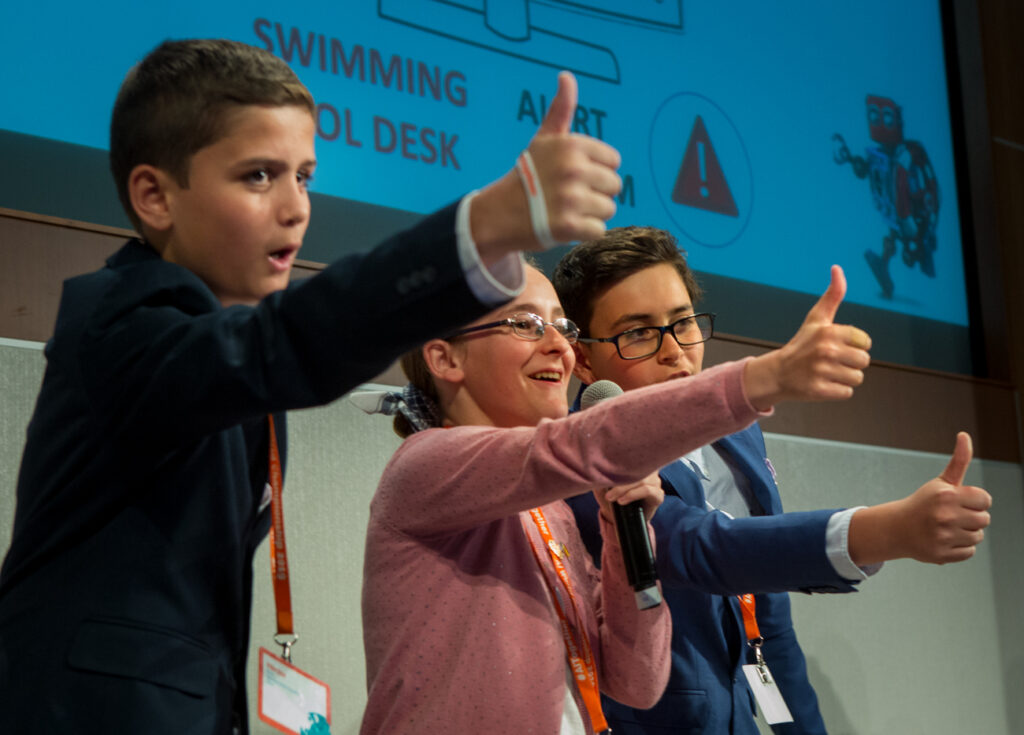Twin sisters Irene and Aitana Aparicio, whose cousin drowned several years ago, last year helped develop an artificial-intelligence system that spots swimmers who are struggling in pools.
The 13-year-olds, who live in Valencia, Spain, worked on the project with their father, Fernando Aparicio, and three fellow students. The system they developed consists of a swim cap with attached lights that turn red if a swimmer is submerged for a certain period. A poolside computer-vision-enabled camera detects the change in color and alerts a lifeguard.
Their team was among hundreds of entries from 13 countries participating in an AI challenge for families that was run by Technovation, a Los Angeles-based nonprofit that teaches
technology and problem-solving skills to people around the world.
Technovation, founded in 2006 as Iridescent, has financial backing from Google.org, the philanthropic arm of Alphabet Inc. ’s Google; Nvidia Corp. ; Intel Corp. and the Patrick J. McGovern Foundation.
The competition drew roughly 7,500 students, parents and local program coordinators from countries including Bolivia, Cameroon, India, Somalia, Spain and the U.S. The students ranged from 8 to 16 years old.
Ultimately, more than 200 teams submitted prototypes and six of them won awards, including the Aparicios. Other winners included a Palestinian team that created an application using image-recognition technology to analyze children’s drawings for signs they might be experiencing bullying.
Technovation is now conducting a second AI challenge, registration for which opened last month. Tara Chklovski, Technovation’s founder and chief executive, said the program will include a focus of ethics.
Part of the goal behind the challenge, Ms. Chklovski said, is to expose families in developing countries to AI applications and development. The programs are run after school or on weekends.
Participants are introduced to the concepts of data, algorithms and machine learning to tackle a problem they believe needs to be solved. Technovation provides them with development tools and program leaders.
After picking the basics, participants learn to work with International Business Machines Corp. software called Machine Learning for Kids, which involves training models to recognize things such as images.
Interest in last year’s challenge was so strong that 95% of the participants completed the 15- week program, which ended in December, Technovation said. Meanwhile, 92% of parents surveyed said they believed their children became so versed in AI that they could explain the technology to others.
“What is the most powerful tool of our time? It is AI,” Ms. Chklovski said. “And so we want to connect the most disempowered, disadvantaged, groups with the most powerful tools of our time.”
AI will affect every job, and business leaders are realizing the importance of having a workforce that understands AI, said Richard Culatta, CEO of the International Society for Technology in Education, a group that helps educators world-wide use and teach technology, including AI.
“The tech industry is moving very quickly,” he said. “People who are in areas that are not getting access to this basic [AI] training will not be able to get any jobs.”
Early on, Technovation focused on teaching girls around the globe computer science and entrepreneurship. Its Technovation Girls program still carries out that mission, but a few years ago Ms. Chklovski said she saw a need to start teaching AI to families.
Mr. Aparicio said the team is still working to improve their project, called Scoutbot WaterGuardian, and they are considering getting a patent. He said he and his daughters learned a lot about AI from the experience.
“The program opened their mind to this,” he said.

